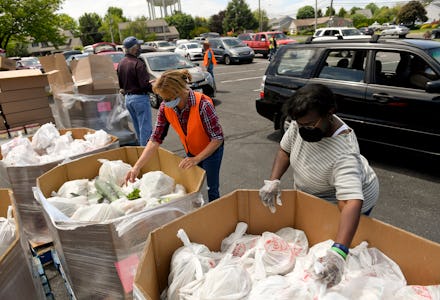A Texas firm got a $39 million contract to deliver food. Food banks have received nothing

Two Texas congressmen are calling on the U.S. Department of Agriculture (USDA) to halt a $39 million contract for food boxes that has yet to result in any food delivery. Democratic Rep. Joaquin Castro, whose district encompasses San Antonio, and Democratic Rep. Lloyd Doggett, who represents Austin, say that a Texas-based event planning firm that was contracted to deliver food to residents in need had neither the experience nor infrastructure to do the job.
The company, CRE8AD8 (read as "create a date"), received funding through a grant process designed to get food boxes to those in need. But soon after the contract was awarded, the San Antonio Express News reported that CRE8AD8 owner Gregorio Palomino lied about having the necessary distribution license, his experience with the local chamber of commerce, major clients he had served, and even where his business was actually located.
CRE8AD8 received its grant through the "Farmers to Families Food Box" program, a USDA effort funded by the Families First Coronavirus Response Act. The original intention was to provide local businesses with the funds to carry out community-based solutions to hunger and food insecurity. But the $3 billion program was implemented quickly and thus without much oversight, and leaders say that this resulted in problems where a local company like CRE8AD8 could receive a grant without demonstrating the skills needed to actually fulfill it.
Qualified businesses with the proper licensing and experience distributing massive amounts of food were passed over for CRE8AD8. The company does not appear to have the infrastructure to process, package, and distribute 18 million pounds of fruits and vegetables to seven different states, as required by the USDA contract.
And while CRE8AD8 has yet to produce any of the food it's being paid to distribute (and was expected to finish disbursing by June 30), the San Antonio Food Bank and those in the surrounding region are struggling to meet the need of hundreds of thousands of Texans who have been laid off or forced to stay at home, thus preventing them from working and being able to afford expenses.
Eric Cooper, the CEO of the San Antonio Food Bank, said that need has doubled since the onset of coronavirus in Texas, where social safety nets in non-pandemic times don't catch everyone. "I need the food," said Cooper. "We’re seeing a 100% increase in demand. We went from feeding 60,000 people a week to 120,000." Hours-long lines made national news a month ago.
Castro said that constituents deserve answers as to why taxpayer money is funding an apparently duplicitous food delivery program. He called for the process by which USDA awarded the grants to be investigated.
A spokesperson for the USDA told the Express that grantees were required to “demonstrate that product could be purchased, moved to a distribution center, and delivered while adhering (to) the USDA high food safety protocols.” The ability of CRE8AD8 to skirt these protocols undetected while misrepresenting its abilities is concerning not just because of the size of the contract, but also because poor families continue to struggle to afford food at stores or obtain it at crowded and undersupplied food banks.
Doggett, meanwhile, is calling for the contract to be voided and halted altogether so that the funds can be redirected to an organization capable of facilitating the work. "As best as I can determine, the Agriculture Department awarded 198 contracts in a single week," Doggett said. "For them to award almost 200 contracts in a week, it’s clear they did not do proper vetting."
Many feel that the the bureaucratic mess with CRE8AD8's funding is a microcosm of how the federal government has approached the dealing with the economic and social impact of coronavirus. The $2 trillion CARES Act passed in March provided a disproportionate amount of funding to corporations rather than individuals and families, its execution has also taken place with generally little oversight. Under the federal government's small business loan program established by the CARES Act, for example, massive enterprises like Shake Shack got loans while struggling non-corporatized businesses didn't.
CRE8AD8 has said that they'll begin food deliveries on June 1. But with the start of the month right around the corner, it's unclear if they'll fulfill that promise or if that too, is just another lie.